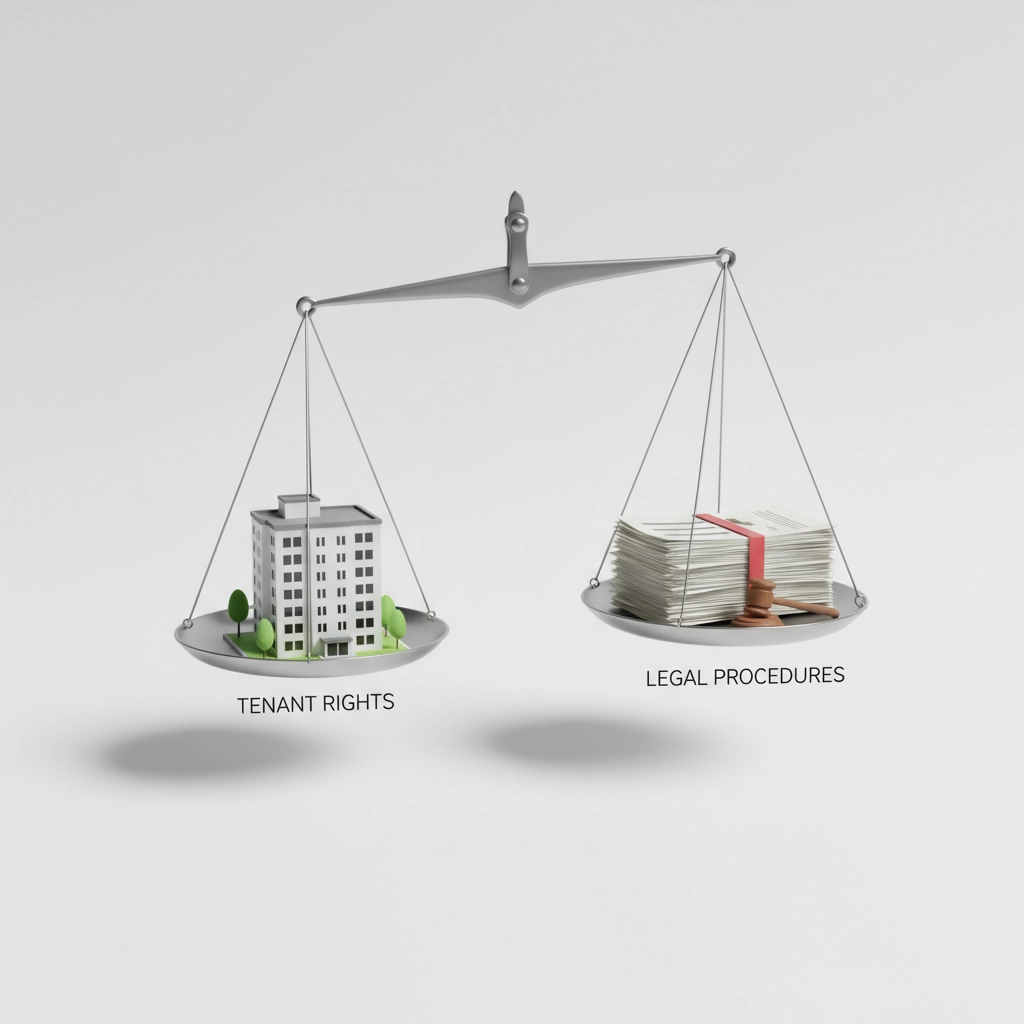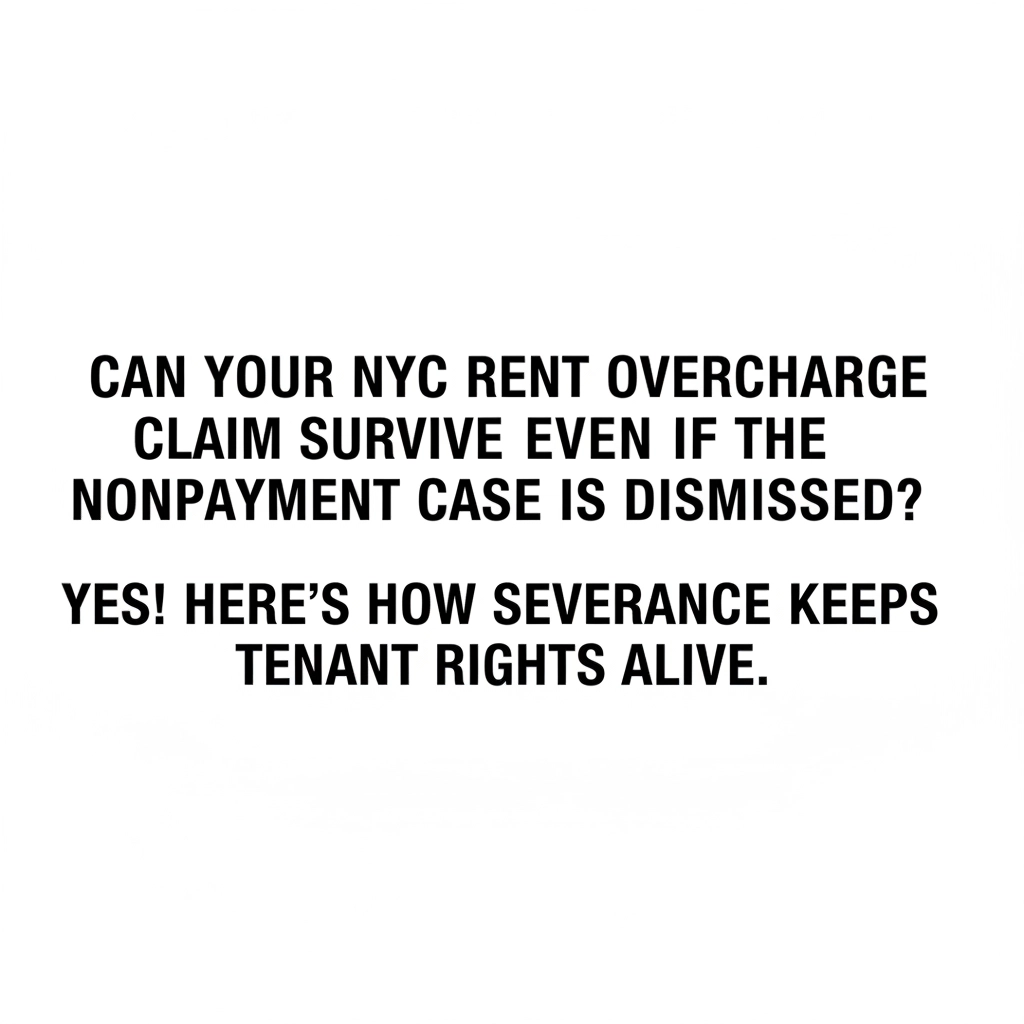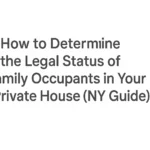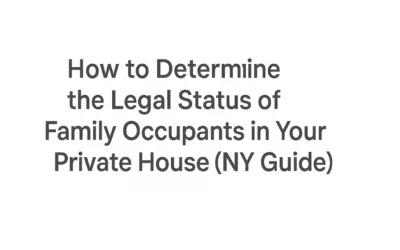In the intricate landscape of New York City's rental housing market, tenant rights stand as fundamental pillars of justice, designed to shield residents from the predatory practices that can emerge in the pursuit of profit. Among these protections, the right to challenge rent overcharges represents a cornerstone of housing stability: a legal safeguard that operates independently of other landlord-tenant disputes and remains viable even when related proceedings falter.
The concept of severance in rent overcharge claims embodies a profound principle of legal protection: that substantive tenant rights cannot be extinguished merely because procedural battles in related cases meet with unfavorable outcomes. This procedural mechanism ensures that when landlords initiate nonpayment proceedings, tenants retain the ability to pursue their overcharge claims as separate, independent causes of action, regardless of whether the original case is dismissed, discontinued, or withdrawn.
The Foundation of Severance: Understanding Independent Legal Rights

The doctrine of severance in rent overcharge disputes operates on the fundamental principle that statutory rights remain inviolate despite the vicissitudes of litigation. New York's rent stabilization laws create independent causes of action that exist separately from landlord-tenant proceedings, forming a protective framework that cannot be dismantled through the dismissal of related cases.
When a landlord files a nonpayment proceeding against a tenant, and that tenant raises a rent overcharge counterclaim or defense, these claims become legally distinct entities. The overcharge claim derives its authority from state housing regulations and rent stabilization statutes: sources of law that establish tenant protections independent of any specific case or proceeding. This separation ensures that even if the underlying nonpayment case fails for procedural reasons, lacks merit, or is withdrawn by the landlord, the tenant's right to pursue overcharge remedies remains unimpaired.
The practical significance of this principle cannot be overstated. Without severance protections, tenants would face the unconscionable prospect of losing legitimate overcharge claims simply because landlords choose to discontinue or fail to properly maintain their nonpayment proceedings. Such a result would undermine the very foundation of tenant protection laws and create perverse incentives for landlords to manipulate the legal system.
Appellate Court Interventions: Preserving Tenant Rights Through Judicial Oversight
The appellate courts of New York have consistently demonstrated their commitment to preserving tenant rights through careful application of severance principles. These decisions reflect a sophisticated understanding of the relationship between procedural mechanisms and substantive protections, ensuring that technical legal maneuvers cannot be used to circumvent tenant safeguards.
Landmark Decisions Shaping Modern Practice
The recent decision in Burrows v. 75-25 153rd St., LLC (2025) exemplifies the appellate courts' active role in protecting tenant rights through severance. This case established clear precedent that rent overcharge claims maintain their independent viability even when the circumstances surrounding the original nonpayment proceeding change dramatically. The court's analysis emphasized that severance serves not merely as a procedural convenience but as an essential protection for statutory rights that exist independent of landlord-initiated proceedings.
In Collazo v. Netherland Property Assets LLC (2020), the appellate division further clarified the scope of severance protections, holding that courts must carefully examine dismissal motions to ensure that viable overcharge claims are not inadvertently extinguished. This decision reinforced the principle that tenant protections require active judicial safeguarding, particularly when landlords seek dismissals that could impact independent statutory rights.
The foundational case of Rockaway One Company, LLC v. Deborah Wiggins (2005) established many of the procedural frameworks that continue to govern severance today. This decision recognized that rent overcharge claims possess inherent value that transcends the specific context in which they arise, requiring courts to treat these claims with the gravity they deserve as protected statutory rights.
More recent decisions, including Marantz v. MD CBD 180 Franklin LLC (2023) and 97-101 Realty, LLC v. Sanchez (2019), have continued to refine and strengthen these protections, ensuring that the evolution of housing law keeps pace with the sophisticated tactics employed by some landlords to avoid accountability.
The Mechanics of Procedural Severance

Understanding how severance operates in practice provides tenants with crucial knowledge about their rights and options. When a nonpayment case includes rent overcharge issues, either as counterclaims or defenses, these overcharge components become subject to severance if the main case faces dismissal, discontinuance, or withdrawal.
The procedural mechanism typically unfolds as follows: when a landlord's nonpayment case encounters fatal flaws or is voluntarily discontinued, the court must determine whether any severable claims exist that merit independent consideration. Rent overcharge claims, being rooted in statutory protections rather than contractual disputes, qualify for this independent treatment.
Courts examine several factors when considering severance, including the nature of the overcharge claim, the evidence supporting it, and the potential prejudice to either party if severance is granted or denied. The overarching principle guiding these determinations is the preservation of legitimate tenant rights while ensuring procedural fairness.
This process requires active judicial oversight because the stakes extend beyond individual cases. Each severance decision contributes to the broader framework of tenant protections, influencing how future courts will balance landlord interests against tenant rights. The appellate courts have consistently emphasized that this balance must favor the preservation of statutory protections, reflecting the legislature's intent to create robust safeguards for tenants in rent-regulated housing.
Principles That Protect: The Triad of Tenant Safeguards
The protection of rent overcharge claims through severance rests upon three fundamental principles that courts consistently recognize and enforce. These principles form an interconnected framework that ensures tenant rights remain viable regardless of the procedural complexities that may arise in related proceedings.
Protected Statutory Rights as Inviolate Interests
The first principle establishes that rent overcharge claims constitute protected statutory rights that cannot be extinguished through procedural manipulation. These rights derive their authority from New York's rent stabilization laws, which create affirmative obligations for landlords and corresponding protections for tenants. Unlike contractual disputes that may be subject to various defenses and limitations, statutory rights carry with them a presumption of enforceability that courts must actively preserve.
This principle recognizes that the legislature, in creating rent regulation schemes, intended to provide tenants with substantive protections that would survive the various legal challenges and procedural obstacles that might arise in the complex world of landlord-tenant litigation. Courts applying this principle examine dismissal motions with heightened scrutiny, ensuring that legitimate statutory rights are not sacrificed on the altar of procedural technicalities.
Severance as Essential Procedural Tool
The second principle treats severance as more than a mere procedural convenience: it is an essential tool for preserving substantive rights. This understanding acknowledges that without robust severance protections, the entire framework of tenant rights could be undermined by strategic procedural maneuvers designed to avoid accountability.
Courts applying this principle recognize that effective severance requires active judicial management. It is not sufficient for courts to simply allow claims to be severed; they must ensure that severed claims receive the same careful attention and protection they would have received as part of the original proceeding. This may require courts to establish new case numbers, ensure proper notice to all parties, and maintain continuity in evidence and procedural history.
Careful Judicial Review of Dismissal Motions
The third principle requires courts to scrutinize dismissal motions carefully when rent overcharge claims are involved. This scrutiny serves multiple purposes: it protects individual tenant rights, maintains the integrity of the rent regulation system, and ensures that dismissals are based on legitimate legal grounds rather than strategic manipulation.
This careful review process often involves examining the relationship between the main proceeding and any overcharge claims, assessing the evidence supporting the overcharge allegations, and determining whether dismissal would result in unfair prejudice to tenant rights. Courts must balance efficiency concerns against the fundamental obligation to preserve statutory protections, erring on the side of protecting tenant rights when the balance is unclear.
Practical Guidance for Tenants: Navigating the Severance Process

For tenants facing the complexity of rent overcharge claims in the context of nonpayment proceedings, understanding the practical aspects of severance can mean the difference between obtaining justice and losing legitimate rights. The process requires careful attention to procedural details while maintaining focus on the substantive protections that severance is designed to preserve.
When a nonpayment case that includes rent overcharge issues faces potential dismissal, tenants should immediately alert the court to the existence of severable claims. This notification serves multiple purposes: it ensures that the court considers severance before entering any dismissal order, it creates a clear record of the tenant's intent to pursue independent overcharge remedies, and it demonstrates the tenant's understanding of their rights under the law.
Documentation plays a crucial role in successful severance. Tenants should maintain comprehensive records of their rental history, including lease agreements, rent receipts, and any communications with landlords regarding rent amounts. This documentation becomes particularly important when overcharge claims are severed because the new proceeding may require independent proof of the allegations.
The timing of severance requests can significantly impact their success. Tenants should raise severance issues as early as possible in proceedings, ideally at the first appearance or in initial responsive pleadings. Delayed requests may face challenges based on waiver or procedural default, making early action essential for protecting tenant rights.
The Broader Impact: Severance as Guardian of Housing Stability
The protection of rent overcharge claims through severance extends far beyond individual cases, serving as a crucial guardian of housing stability throughout New York City. This broader impact reflects the interconnected nature of tenant protections and the importance of maintaining robust enforcement mechanisms for rent regulation laws.
When courts properly apply severance principles, they send clear signals to landlords that overcharge violations will face serious consequences regardless of the procedural complexities that may surround individual cases. This deterrent effect helps maintain the integrity of the rent regulation system by ensuring that violations cannot be avoided through strategic dismissals or discontinuances.
The cumulative effect of proper severance application creates a body of case law that strengthens tenant protections over time. Each decision that preserves overcharge claims through severance contributes to a growing framework of precedent that makes it increasingly difficult for landlords to avoid accountability for rent violations.
Taking Action: When Professional Guidance Becomes Essential
The complexity of severance proceedings and the high stakes involved in rent overcharge claims make professional legal guidance essential for many tenants. Understanding when to seek this guidance can determine whether legitimate claims receive proper protection or fall victim to procedural complications.
Tenants facing nonpayment proceedings that include potential overcharge issues should consider seeking legal counsel as soon as possible. Early intervention allows attorneys to properly frame overcharge claims, ensure that severance issues are addressed promptly, and maximize the likelihood of successful outcomes.
The expertise required for effective severance advocacy extends beyond basic landlord-tenant knowledge to include sophisticated understanding of appellate precedent, procedural requirements, and strategic considerations. At The Ottley Law Firm, PC, we recognize that protecting tenant rights requires both legal knowledge and practical experience in navigating the complexities of New York's housing courts.
For tenants who believe they have been overcharged, the path forward requires both courage and strategic thinking. The legal protections exist, the appellate precedent supports tenant rights, and the procedural mechanisms provide pathways to justice: but realizing these benefits requires informed action and, often, professional advocacy that can navigate the complexities of modern housing litigation.
Through proper understanding and application of severance principles, rent overcharge claims can indeed survive and thrive even when related nonpayment cases face dismissal, ensuring that tenant rights remain protected and that the promise of fair housing remains a reality rather than merely an aspiration.









0 Comments